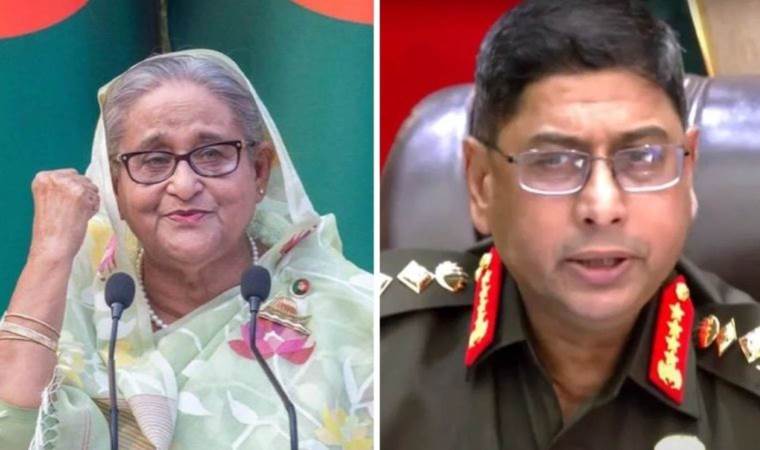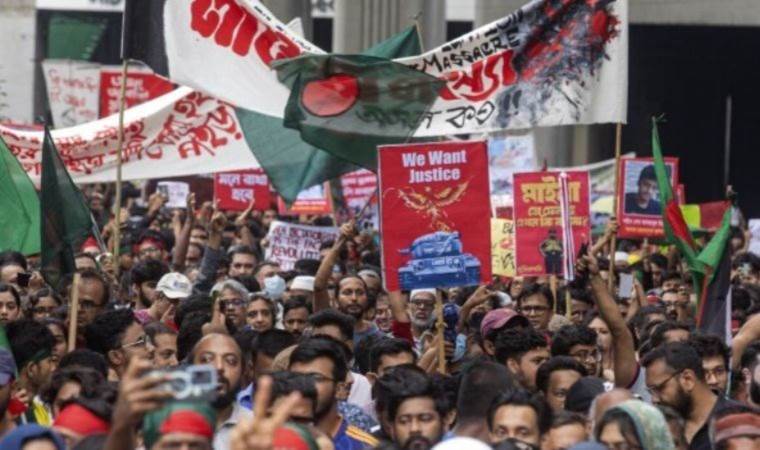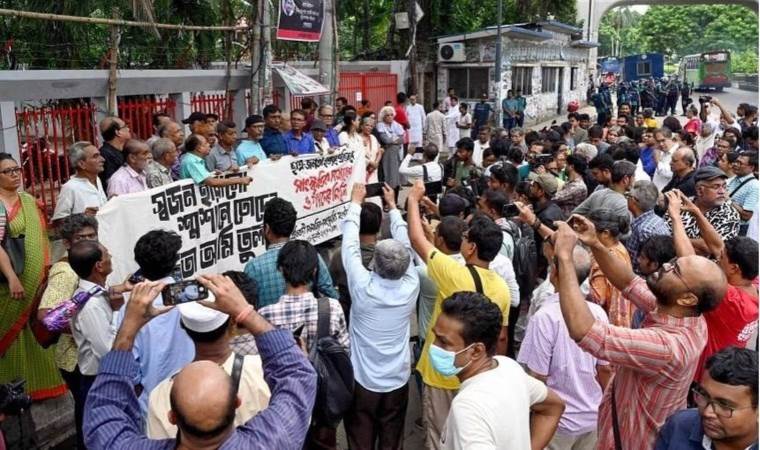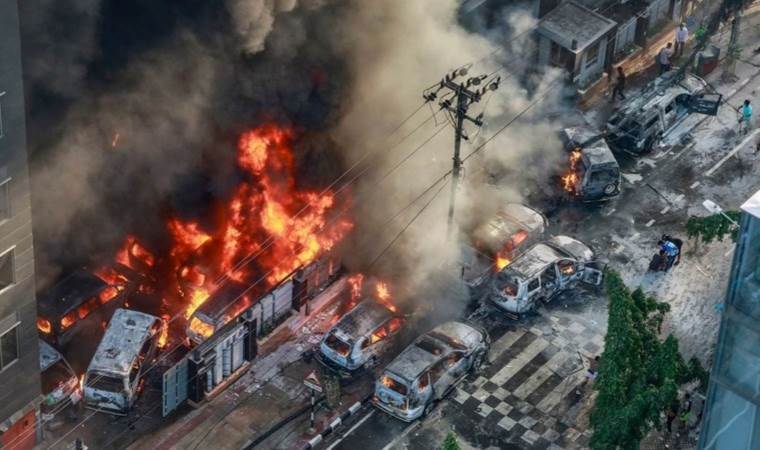Protests in Bangladesh lead to resignation, PM fleed to India
Bangladesh's ongoing protests have led the military to announce the establishment of a transitional government. Meanwhile, former Prime Minister Sheikh Hasina has left the country, landing at Hindon Air Base near India's capital, New Delhi.

TRANSITIONAL GOVERNMENT ANNOUNCEMENT
As protests continue in Bangladesh, the military declared the formation of a transitional government following Prime Minister Sheikh Hasina's departure from her official residence.
Bangladesh Army Commander General Waker-Uz-Zaman stated that martial law would not be necessary if the demonstrations and violence subside.
General Waker-Uz-Zaman pledged to investigate the deaths of protesters, saying, "After productive talks with all political parties, we decided to establish a transitional government. We will now meet with Bangladesh President Mohammed Shahabuddin to resolve the situation."
WHERE DID PRIME MINISTER HASINA GO?
According to Indian media, the helicopter carrying Prime Minister Sheikh Hasina landed at Hindon Air Base near New Delhi.
Dhaka Tribune reported that Hazrat Shahjalal International Airport in the capital Dhaka was closed, and flights were suspended for six hours.
Bangladeshi media reported that protesters toppled the statue of the country's founding leader and Prime Minister Hasina's father, Sheikh Mujibur Rahman, in Dhaka.
Protesters were also reported to have ransacked the residences of the Interior Minister and other government officials.
WHY DID THE PROTESTS START?
Student protests in Bangladesh began with demands to abolish a system that reserved 30% of public sector jobs for children of those who participated in the 1971 War of Independence.
These demonstrations, against the quotas, sparked violent clashes nationwide.
The protests intensified after the Supreme Court reinstated the controversial quota system last month.
On Sunday, the country's highest court, the Constitutional Court, overturned the Supreme Court's decision that had sparked the demonstrations.
Hasina had offered unconditional dialogue to student leaders, saying, "I want to sit with the protesting students and listen to them. I do not want any conflict," but the protesting students rejected this offer.
HOW DID THE PROTESTS ESCALATE?
In Bangladesh, 56% of public sector job positions are reserved for specific demographic groups and classes, with 30% allocated to families of those who fought in the 1971 War of Independence. These quotas were abolished in 2018 due to protests.
The Supreme Court's decision in June to reinstate the quota system sparked renewed protests in July.
Dhaka University students began demonstrating on July 15 with banners and flags, calling for reforms to the quota decision.
Clashes at the university and police intervention led to the deaths of six people and injuries to 250 students. All universities nationwide were then indefinitely closed, but students refused to leave their campuses.
SUPREME COURT BACKTRACKS
On July 21, the Bangladeshi Supreme Court revised its decision that had ignited the protests.
The court reduced the quota for families of War of Independence participants from 30% to 5%, allocating 2% to ethnic minorities and disabled individuals and 93% based on merit.
On July 23, Prime Minister Hasina blamed the violence on the main opposition Bangladesh Nationalist Party (BNP) and the Bangladesh Jamaat-e-Islami Party.
Despite the government's announcement on July 24 to comply with the court's decision, tensions remained high. A partial curfew continued under military control.
PARTY THAT STARTED THE PROTESTS BANNED
The day after the protests ended, on July 29, the Awami League-led group of 14 parties decided to ban the Jamaat-e-Islami Party and its student wing for "vandalism and chaos" during the public sector quota protests.
The party and its student wing Chhatra Shibir were officially banned on August 1.
FORMER BANGLADESH AMBASSADOR LOGOGLU: CONSTANT RESTRICTIONS
Former Bangladesh Ambassador and ex-CHP Adana MP Faruk Loğoğlu assessed the developments in Bangladesh.
Loğoğlu, who served as a diplomat in Bangladesh between 1976-1978, said:
"Bangladesh is not unfamiliar with military rule. In the 1970s and 80s, it was governed by military regimes. However, Bangladesh has made significant economic progress in recent years. But Prime Minister Sheikh Hasina, who has ruled Bangladesh for nearly 20 years, has continuously restricted freedoms, especially freedom of expression. She has increasingly moved Bangladesh away from being a country that adheres to democratic principles."
"UNPRECEDENTED UPRISING IN THE COUNTRY'S HISTORY"
Loğoğlu noted that some laws enacted by Hasina in recent years have sparked anger and protests. He stated, "The military leader has taken over, announcing the formation of a transitional government and promising to restore Bangladesh's democratic structure as soon as possible."
Emphasizing the unprecedented scale of the uprising in Bangladesh's history, Loğoğlu said, "This uprising, involving a broad segment of society, includes not just the youth but all layers of society. Despite significant casualties, it was clear that the protests would continue."
Regarding the formation of a transitional government, Loğoğlu suggested, "The military will likely establish a transitional government by consulting with the country's political leaders and civil society organizations to end military rule as quickly as possible. I believe they can achieve this."
Commenting on Hasina's departure, Loğoğlu said, "Hasina fled, and her whereabouts are unknown. The new civilian government will likely issue necessary announcements and request her extradition. They will probably seek to bring her to justice, but it's challenging to predict exactly what will happen at this stage."
Highlighting the significance of the events in Bangladesh for democracy, Loğoğlu said, "Depending on the military's actions, the people's strong anti-government protests and the sacrifices made to sustain these demonstrations provide a powerful example of democracy and citizens standing up for their rights."
Most Read News
-
 Pakistan army says 34 militants killed in security opera
Pakistan army says 34 militants killed in security opera
-
 UN mission in Kabul welcomes ceasefire between Afghanist
UN mission in Kabul welcomes ceasefire between Afghanist
-
 Germany's Merz says Gaza plan brings new hope for lastin
Germany's Merz says Gaza plan brings new hope for lastin
-
 Israeli army arrests 24 Palestinians across occupied Wes
Israeli army arrests 24 Palestinians across occupied Wes
-
 Federal grand jury indicts man accused of starting Palis
Federal grand jury indicts man accused of starting Palis
-
 Ukraine’s Zelenskyy says meeting with Trump could help b
Ukraine’s Zelenskyy says meeting with Trump could help b
-
 New York mayoral candidate Mamdani apologizes to police
New York mayoral candidate Mamdani apologizes to police
-
 Russia says it has ‘nothing to report’ on Assad extradit
Russia says it has ‘nothing to report’ on Assad extradit
-
 EU unveils roadmap to boost defense readiness, eyes anti
EU unveils roadmap to boost defense readiness, eyes anti
-
 Reappointed French premier's government survives 2 votes
Reappointed French premier's government survives 2 votes













